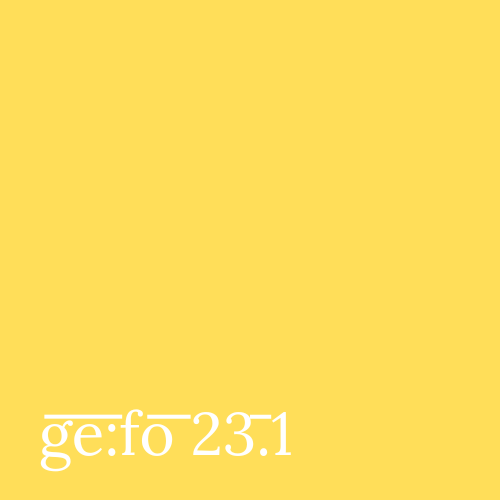Queer and West African Temporalities in Bernardine Evaristo's Girl, Woman, Other
DOI:
https://doi.org/10.18716/ojs/gefo/2024.2266Keywords:
time, temporality, queer temporality, West African temporality, chrononormativity, LGBTQ+ LiteratureAbstract
Bernardine Evaristo’s novel Girl, Woman, Other (2019) explores the life stories of twelve mainly Black and female, and some queer, characters. West African culture is represented not only through some of the characters’ identities but also through paratextual symbolism of Adinkra signs accompanying the protagonists’ names. The Akan concept of Sankofa, or ‘going back in time to learn for the future’, resonates through the characters’ construction of identity rooted in memories and continuous hope for a utopian future. Queer temporality provides another fruitful framework for interpreting non-normative and resistant performances of time. Looking forward while feeling backwards (Love) and striving towards a utopian future (Muñoz) are the focal points of a queer performance of time in this analysis. The need for an intersectional approach to interrogations of queer and West African temporality in the novel thus becomes apparent: Queer temporality must be thought in conjunction with West African temporal circularity.
This article presents an exemplary literary analysis of two characters/subchapters: Amma, a middle-aged lesbian playwright, and Megan/Morgan, a non-binary content creator and activist, in order to illuminate nuanced ways in which queer and (West) African temporalities are narrated, performed, and experienced. Amma’s story unfolds predominantly through analepses, intricately weaving together past and present relationships, and anticipates a future performance of her theatre play, thus aligning with a queer and postcolonial emphasis on futuristic world-building. Megan/Morgan enacts queer time through their transition, challenging chrononormativity and offering a queer critique of non-linear learning processes. Both subchapters exemplify a constant state of becoming, sharing a common thread of queer and West African temporality expressed through non-linearity and circularity against the conventional arrow of time. The acts of circling back, reclaiming the past, and desiring a utopian queer future become a performance of queer and West African temporalities.



